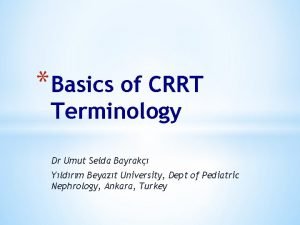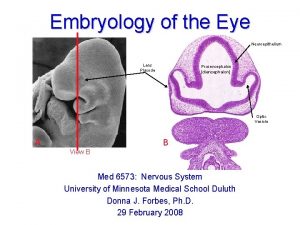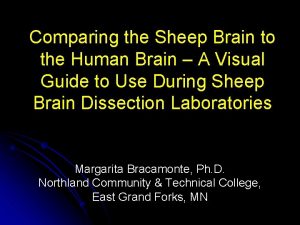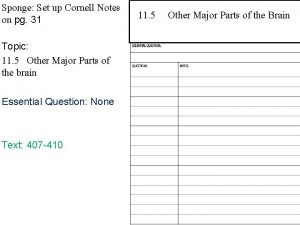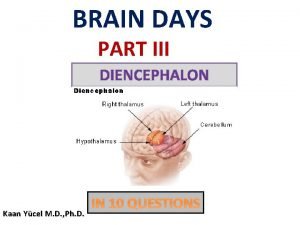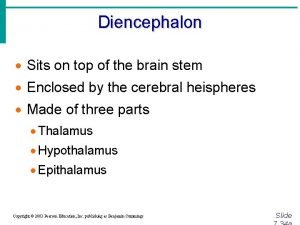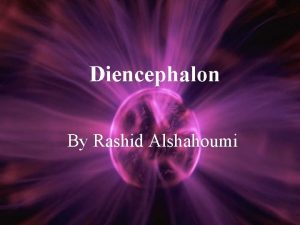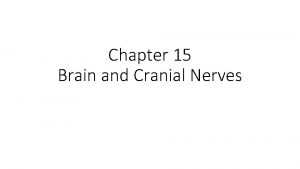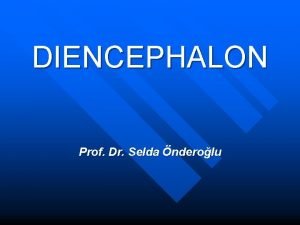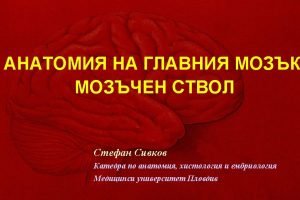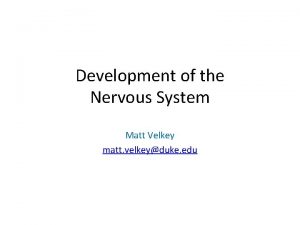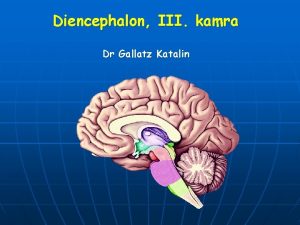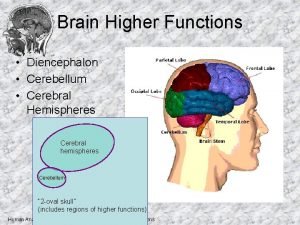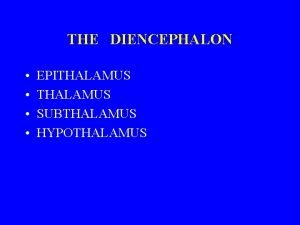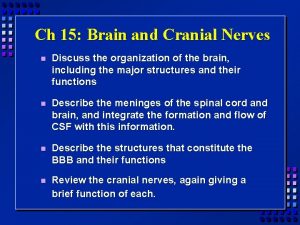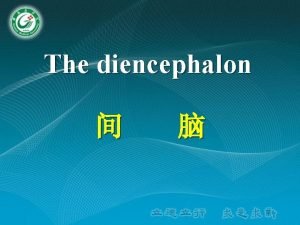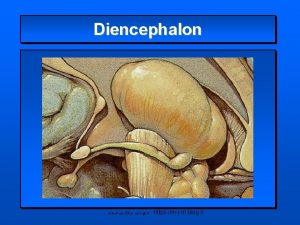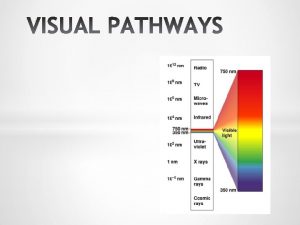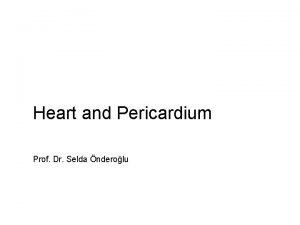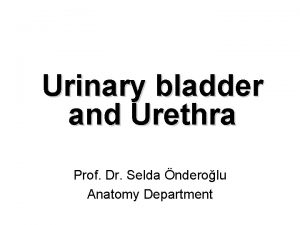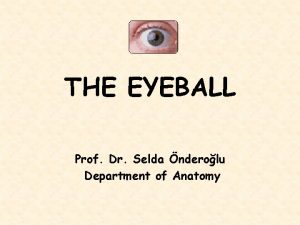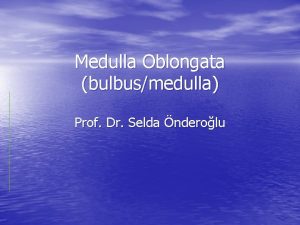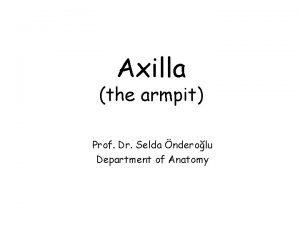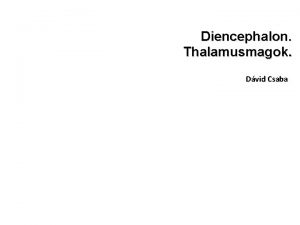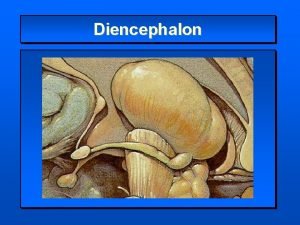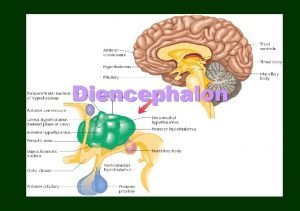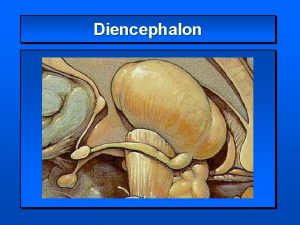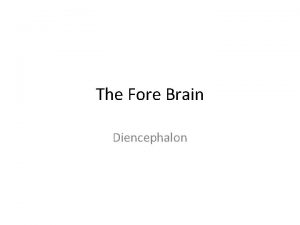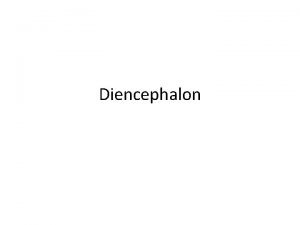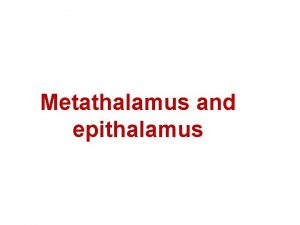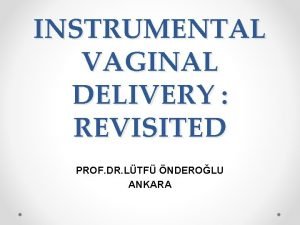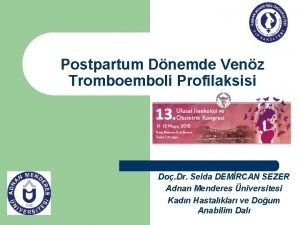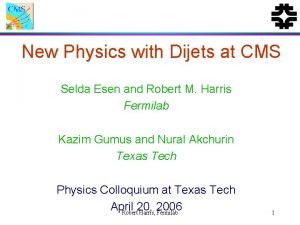DIENCEPHALON Prof Dr Selda nderolu n DIENCEPHALON Diencephalon






















- Slides: 22

DIENCEPHALON Prof. Dr. Selda Önderoğlu

n DIENCEPHALON Diencephalon is the part of CNS located on both sides of 3 rd ventricle. Extends ant. ly from interventricular foramen postly to cerebral aequaduct.

PARTS OF DIENCEPHALON n. Thalamus, n. Hypothalamus, n. Epithalamus n. Subthalamus

Thalamus n part of diencephalon n located deeply in the cerebral hemispheres n Shape: egg n Gray matter

Thalamus Relations: Ant. : Head of caudate nucl. + genu of internal capsule Ant. End forms the post. Border of interventricular foramen Post. : Pulvinar of thalamus


Surfaces of thalamus n Medial surface n Lateral surface n Superior surface n Inferior surface

medial surface Forms the upper part of lateral wall of 3 rd ventricle interthalamic mass (adhesion)

Lateral surface n Posterior limb of internal capsule n Seperated from lentiform nucleus by internal capsule

Superior surface n Terminal Sulcus (superior Thalamostriate vein and stria terminalis courses here)



inferior surface n n Ant. Separated from Hypothalamus by hypothalamic sulcus post Tegmentum of Mesencephalon

Internal structure Gray matter ( nueorn groups, nuclei) n White matter ( internal and external medullary lamina) n

Internal Medullary Lamina and External Medullary Lamina

n anterior Nuclei of Thalamus n medial n Ventral (VPM&VPL) n dorsal n Posterior(in pulvinar) n Median n intralaminar n reticular

Anterior nuclei Located in the anterior tubercle of thalamus located ant. thought to be related to memory

Ventral Nuclei of Thalamus ventral anterior ventral lateral ventral post. Posteromedial Posterolateral Posteroinferior

Metathalamus medial Geniculate body lateral geniculate body

Medial Geniculate body Related to auditory pathways by the Brachium of inf. Colliculus it is connected to lateral lemniscus ( afferent) and send stimuli to the auditory center in cerebral cortex ( 41 -42 of Brodman areas) (efferent)

Lateral Geniculate body Relay nuclei related to vision Afferent fibers from retina and c superior colliculus Efferent fibers to Brodmann 17

Functions of Thalamus n Conveys impulses related to different sensations to cerebral sensory center (cortex). n Fibers from cerebellum, basal ganglia, peripheral sensory organs fist go to thalamus modified there and then goes to cerebral cortex. n Sense of smell first goes to its center in cortex, then relays in thalamus.
 Selda bayrak
Selda bayrak Selda kavak
Selda kavak Lens placodes
Lens placodes What is the diencephalon
What is the diencephalon 4th ventricle sheep brain
4th ventricle sheep brain Brain diencephalon
Brain diencephalon Habenular nuclei
Habenular nuclei Cummings
Cummings Diencephalon
Diencephalon Subthalamus function
Subthalamus function Arbor vitae
Arbor vitae Diencephalon
Diencephalon Sulcus basilaris
Sulcus basilaris 22 days
22 days Recessus triangularis
Recessus triangularis Function of diencephalon
Function of diencephalon Epithalamus and subthalamus
Epithalamus and subthalamus Telencephalon diencephalon mesencephalon
Telencephalon diencephalon mesencephalon Diencephalon
Diencephalon Blog ir
Blog ir Trigonum habenulae
Trigonum habenulae Cajal bodies
Cajal bodies Habenular nuclei
Habenular nuclei
